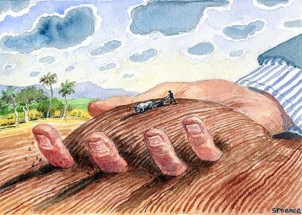
Here is an update on the topic of landgrabbing in Liberia, on which we have reported in a podcast earlier. Liberia is a hotspot of landgrabbing in Africa with more than 50% of the land already being allocated to foreign investors. Local communities who customarily own the land are often helpless to these acquisitions and only learn about deals between the government and corporations when companies show up and take their land. Communities are resisting this corporate takeover of their land and –sometimes – they are winning. All over Africa people are sending a clear message to their governments: stop selling Africa to corporations. The Jogbahn Clan in Liberia is one such community. Silas Kpanan’Ayoung Siakor and Jacinta Fay – EJOLT collaborators from the Sustainable Development Institute/Friends of the Earth, Liberia wrote a moving blog post on their story: ‘When our land is free, we’re all free’. Here are some excerpts:
“The communities’ resistance began in 2012 when the British palm oil company Equatorial Palm Oil PLC (EPO) began to expand their plantation onto community land. The Government of Liberia and EPO had signed a concession agreement allowing the company’s plantation to engulf the communities’ land amounting to over 20,000 hectares. Thus, the Clan organised and men, women and youth from the 11 affected towns chose representatives to form a core group to lead the resistance. They met the company and the government several times to object to the company’s expansion. In spite of this towards the end of 2012 EPO began clearing and planting their land destroying crops and farmland.”
“In September 2013 EPO began surveying the communities’ land without their consent. When communities attempted to stop the survey a paramilitary police unit was deployed into the area. People suffered harassment and intimidation by EPO security and the police. People were also assaulted during a peaceful march and 17 people suffered arbitrary arrest. Despite these aggressive tactics the community continued resisting. They lodged a complaint to the Roundtable on Sustainable Palm Oil (RSPO) and presented a petition to the government stating their objections. The community refused to be weakened by division and eventually secured the crucial meeting with the Liberian President Ellen Johnson Sirleaf where she recognised their right to say ‘no’ to the company.”
“But the company is not listening. Despite the Presidential statement, EPO is continuing to conduct studies of the Clan’s land in preparation for clearance. Silas Kpanan’Ayoung Siakor, campaigner for the Sustainable Development Institute/Friends of the Earth Liberia said: “Equatorial Palm Oil must listen to the Jogbahn Clan and accept that their ‘no’ means ‘no’. The continuing determination of these communities is a cautionary tale for corporations who think they can ignore communities’ rights and ownership of land”.”
Tell the company to listen the community and the government. Add your voice to the petition to tell EPO and its major shareholders KLK that the world is watching. NO means NO!
Watch and share this video and read more about the clan’s story in this moving blog post ‘When our land is free, we’re all free’ by Silas Kpanan’Ayoung Siakor and Jacinta Fay from the Sustainable Development Institute/Friends of the Earth, Liberia.
Also, for more info on biomass and land conflicts in Africa have a look at the Atlas of Environmental Justice with so far 64 reported cases.
Sustainable Development Institute/Friends of the Earth, Liberia is a national civil society organisation promoting the sustainable and just use of Liberia’s natural resources.

The project ENVJUSTICE has received funding from the European Research Council (ERC) under the European Union’s Horizon 2020 research and innovation programme (grant agreement No. 695446)